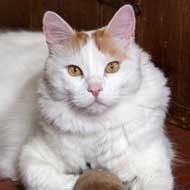
Who will be the UK's top cat in this year's National Cat Awards?
Seventeen fabulous felines have been announced as finalists in Cats Protection's National Cat Awards 2014.
Organised by the UK's largest cat charity, the event is designed to celebrate the extraordinary tales of survival, companionship and bravery in the feline world.
The 17 shortlisted cats have been announced across five categories: Hero Cat, Most Caring Cat, Most Incredible Story and The Most Outstanding Rescue Cat. Finalists include: Elias, a caring puss who helps his Army veteran owner cope with post-traumatic stress disorder and Milly Moos, a family cat who calms a toddler's nerves by accompanying him on the school run.
Owners now face a nail-biting wait until a star-studded award ceremony on August 7 at The Savoy Hotel in London. Category winners will be announced and one will be named the overall National Cat of the Year.
Kate Bunting, awards organiser, said: “We received hundreds of entries from across the UK and every single one was a reminder of the special place cats have in the lives of their owners. The National Cat Awards is about celebrating the things that make cats such unique and wonderful pets. From the touching stories of companionship to the amazing stories of bravery and survival, it's been a real pleasure to receive so many heart-warming stories about the nation's cats.”
The current National Cat of the Year is Jessi-Cat from Manchester, who helps nine-year-old Lorcan Dillon cope with Asperger's syndrome and selective mutism.
Winners in four categories will be chosen by celebrity judges including Downton Abbey star Paul Copley, Emmerdale actress Eden Taylor-Draper, West End actress Carley Stenson and Republica singer Saffron Sprackling.
To view details of all the finalists, please visit www.cats.org.uk/get-involved
Image courtesy of Phil Carpenter.



 The Veterinary Medicines Directorate (VMD) is inviting applications from veterinary students to attend a one-week extramural studies (EMS) placement in July 2026.
The Veterinary Medicines Directorate (VMD) is inviting applications from veterinary students to attend a one-week extramural studies (EMS) placement in July 2026.